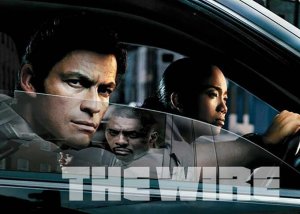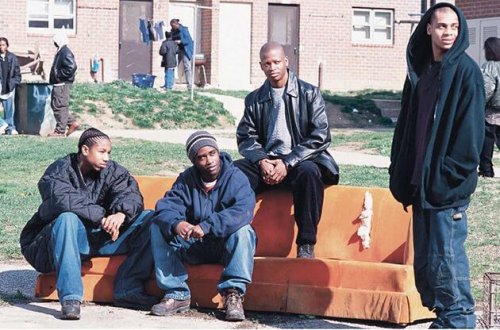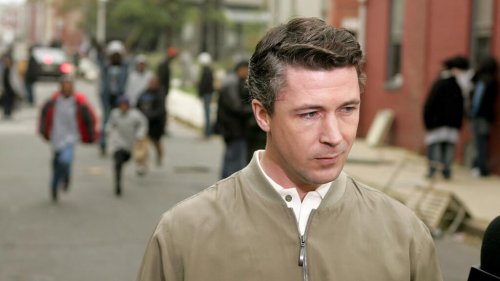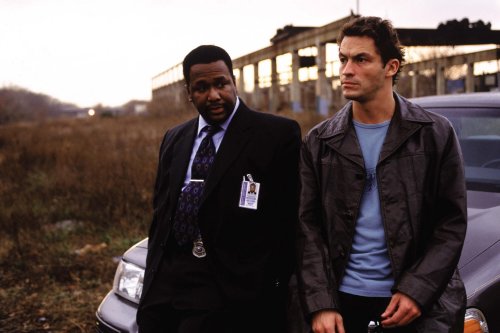A Glimpse Into Criminality Through The Wire

HBO aired The Wire between 2002 and 2008. The series takes place in the city of Baltimore, Maryland. David Simon created the series. He worked for years as a journalist for The Sun newspaper.
The series focuses on the slums of Baltimore, where there’s a lot of drugs and crime. Not only that, but everything else is dangerous. There’s awful financial and social situations, police action, and internal fights between drug trafficking gangs. The Wire offers us a glimpse into all the different aspects that operate in this type of world, from the consumer to the top political sphere.
The world of The Wire
We hear several gunshots and heartbreaking shrieks in the quiet morning air. Some heads are poking out of windows and then… nothing. Only silence. Everybody goes about their morning routine as if nothing had happened. The residents of this Baltimore neighborhood are used to the waves of violence that shake the streets they walk on daily. Drugs are normal parts of every corner. Young people start working for different dealer gangs at a very young age. Drugs are the only outlet they can find in their environment.
“Everyone’s in the business.”
-Typical of West Baltimore-

The police
The police work every day to control and fight organized gangs. The show highlights the futility of their methods. The series portrays the police as a group that’s unable to evolve or improve because of the resources they have at hand. They stumble due to a hierarchical, static system. This system is based on the “chain of command” where the only concern is reaching the top. Rules limit people from doing their job. This makes the police ineffective and they frequently have to deal with an old problem: the surprise factor.
“No one wins. One side just loses more slowly.”
-Prezvalousky-
Crime is just feedback between the police and the offender. The police can’t do anything if the offender doesn’t commit the crime. If the police change the rules or try something different, the criminal will only find new ways of committing the crime.
The lesson the show tries to bestow upon us is that it’s practically impossible to anticipate or completely stop crime. It’s the criminals who create crime, and the police must act according to how the criminals change and evolve.
Politics and contraband
On the other hand, there are political rivalries in the series. The struggle for power justifies all means including bribes, public fund embezzlement, etc. There are things that feed an ongoing, vicious cycle. This is a recurring theme throughout the series.
The people “at the top” impose limitations that don’t help the fight against organized crime and drug trafficking. This goes to show that powerful people in politics are accomplices in crime because they benefit, directly or indirectly, from the world of crime. However, the series also reflects on another phenomenon: politicians. Since the gangs give the politicians plenty of money, the politicians allow the gangs to go untouched. Together, they form a symbiotic relationship.
“The King stays the King.”
-D’Angelo-
In the same way, The Wire tries to focus its attention on the people who supply the drugs and the dealers who move it to its final destination. The Port of Baltimore is the main trafficking sport. Union members make demands to politicians, but the politicians don’t care. This makes the union members resort to theft and illegal activities in order to incentivize and motivate the public to listen to what they have to say.
“Business. Always business…”
-The Greek-

School
Education is another of the great institutions that fosters drug-related crimes. The standardization of courses and classes promotes truancy. Schools treat young people as numbers that must reach the legally required rates so that the school can keep running. Thus, teachers only care that students go to class on the first day so they can mark them as present.
Therefore, the concern lies in the need to keep courses stable and balanced. Students frequently pass course requirements without acquiring the required skills. This happens because the system doesn’t want to continue to deal with that student. Making them repeat a grade requires extra funds that the system isn’t willing to give.
Means of communication
The series shows the press as a medium that lies and over exaggerates for increased readership. Newspapers need new information to stay relevant. In order to keep running, newspapers exaggerate their news to increase readers’ interest. This, in turn, increases profit. This is particularly harmful to the worlds of crime and politics. If the newspaper is constantly twisting the truth, crime and politics are at the mercy of manipulation.
“A lie ain’t a side of a story. It’s just a lie.”
-Terry Hanning-

The Wire tells a story of the system’s influence and its inability to evolve. People have created the system in a way that makes it impossible for them to abandon it. In the end, all the drama ends up creating a cycle of violence and power where the smallest, given their social circumstances, must adapt to a hostile world.
The characters face an environment with few resources that push them directly into a world of violence and destruction. The system that these people created is the same system that makes them succumb to the violence of their own making.
“Just a gangster, I suppose.”
-Avon Barksdale-
HBO aired The Wire between 2002 and 2008. The series takes place in the city of Baltimore, Maryland. David Simon created the series. He worked for years as a journalist for The Sun newspaper.
The series focuses on the slums of Baltimore, where there’s a lot of drugs and crime. Not only that, but everything else is dangerous. There’s awful financial and social situations, police action, and internal fights between drug trafficking gangs. The Wire offers us a glimpse into all the different aspects that operate in this type of world, from the consumer to the top political sphere.
The world of The Wire
We hear several gunshots and heartbreaking shrieks in the quiet morning air. Some heads are poking out of windows and then… nothing. Only silence. Everybody goes about their morning routine as if nothing had happened. The residents of this Baltimore neighborhood are used to the waves of violence that shake the streets they walk on daily. Drugs are normal parts of every corner. Young people start working for different dealer gangs at a very young age. Drugs are the only outlet they can find in their environment.
“Everyone’s in the business.”
-Typical of West Baltimore-

The police
The police work every day to control and fight organized gangs. The show highlights the futility of their methods. The series portrays the police as a group that’s unable to evolve or improve because of the resources they have at hand. They stumble due to a hierarchical, static system. This system is based on the “chain of command” where the only concern is reaching the top. Rules limit people from doing their job. This makes the police ineffective and they frequently have to deal with an old problem: the surprise factor.
“No one wins. One side just loses more slowly.”
-Prezvalousky-
Crime is just feedback between the police and the offender. The police can’t do anything if the offender doesn’t commit the crime. If the police change the rules or try something different, the criminal will only find new ways of committing the crime.
The lesson the show tries to bestow upon us is that it’s practically impossible to anticipate or completely stop crime. It’s the criminals who create crime, and the police must act according to how the criminals change and evolve.
Politics and contraband
On the other hand, there are political rivalries in the series. The struggle for power justifies all means including bribes, public fund embezzlement, etc. There are things that feed an ongoing, vicious cycle. This is a recurring theme throughout the series.
The people “at the top” impose limitations that don’t help the fight against organized crime and drug trafficking. This goes to show that powerful people in politics are accomplices in crime because they benefit, directly or indirectly, from the world of crime. However, the series also reflects on another phenomenon: politicians. Since the gangs give the politicians plenty of money, the politicians allow the gangs to go untouched. Together, they form a symbiotic relationship.
“The King stays the King.”
-D’Angelo-
In the same way, The Wire tries to focus its attention on the people who supply the drugs and the dealers who move it to its final destination. The Port of Baltimore is the main trafficking sport. Union members make demands to politicians, but the politicians don’t care. This makes the union members resort to theft and illegal activities in order to incentivize and motivate the public to listen to what they have to say.
“Business. Always business…”
-The Greek-

School
Education is another of the great institutions that fosters drug-related crimes. The standardization of courses and classes promotes truancy. Schools treat young people as numbers that must reach the legally required rates so that the school can keep running. Thus, teachers only care that students go to class on the first day so they can mark them as present.
Therefore, the concern lies in the need to keep courses stable and balanced. Students frequently pass course requirements without acquiring the required skills. This happens because the system doesn’t want to continue to deal with that student. Making them repeat a grade requires extra funds that the system isn’t willing to give.
Means of communication
The series shows the press as a medium that lies and over exaggerates for increased readership. Newspapers need new information to stay relevant. In order to keep running, newspapers exaggerate their news to increase readers’ interest. This, in turn, increases profit. This is particularly harmful to the worlds of crime and politics. If the newspaper is constantly twisting the truth, crime and politics are at the mercy of manipulation.
“A lie ain’t a side of a story. It’s just a lie.”
-Terry Hanning-

The Wire tells a story of the system’s influence and its inability to evolve. People have created the system in a way that makes it impossible for them to abandon it. In the end, all the drama ends up creating a cycle of violence and power where the smallest, given their social circumstances, must adapt to a hostile world.
The characters face an environment with few resources that push them directly into a world of violence and destruction. The system that these people created is the same system that makes them succumb to the violence of their own making.
“Just a gangster, I suppose.”
-Avon Barksdale-
This text is provided for informational purposes only and does not replace consultation with a professional. If in doubt, consult your specialist.







